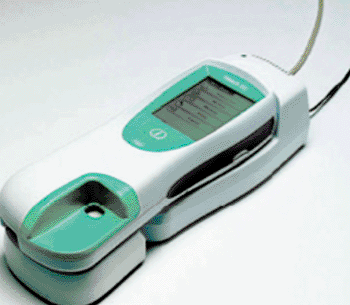Rapid Diagnosis Possible at POC
By LabMedica International staff writers
Posted on 05 Mar 2013
A versatile handheld device enables rapid diagnosis at point of care (POC).Posted on 05 Mar 2013
In hospitals, Roche's (Burgess, United Kingdom) products can support laboratory services by providing accurate diagnosis of patient samples and enabling rapid diagnosis of medical conditions in the emergency ward, intensive care, and in the operating theatre.

Image: The hand-held cobas h 232 is suitable for use in different clinical settings, from the General Practitioner’s office to the Emergency Room (Photo courtesy of Roche).
Forth Valley Royal Hospital (United Kingdom) has reduced lengths of stay and ward admissions for patients presenting with chest pain, as well as ensuring rapid referral for patients with positive findings, through the introduction of a Chest Pain Assessment Unit (CPAU). This unit provides patient care and rapid access to diagnostic testing, including Troponin T testing, using the Roche point of care (POC) cardiac marker system, cobas h 232.
“Prior to opening the CPAU, patients at low risk of Acute Coronary Syndrome (ACS) were spending a long time in hospital unnecessarily, often overnight, while ACS was ruled out,” explained nurse consultant-acute medicine, Sharon Oswald. “To obtain real-time results that enable rapid decisions to be made, we introduced the Roche cobas h 232 system for point-of-care Troponin T testing. The cobas h 232 has had a huge impact on the service. Before we introduced it, Troponin T tests were batched and performed four times per day in the laboratory. There were sometimes delays in getting the bloods to the laboratory and then in getting results back. Now, with the cobas h 232 systems, we are able to obtain results in real time, which allows faster decision making.”
“The cobas h 232 system is very sensitive,” Sharon added. “A six month comparative evaluation demonstrated that we were getting comparable results to the laboratory method. We still send positives to the laboratory for confirmation but negative results do not require further confirmation. This means [we can exclude] ACS more quickly, allowing earlier discharge. Patients that require further investigation or care can be referred immediately or given a planned return appointment.”
Related Links:
Roche
Forth Valley Royal Hospital







 Analyzer.jpg)





